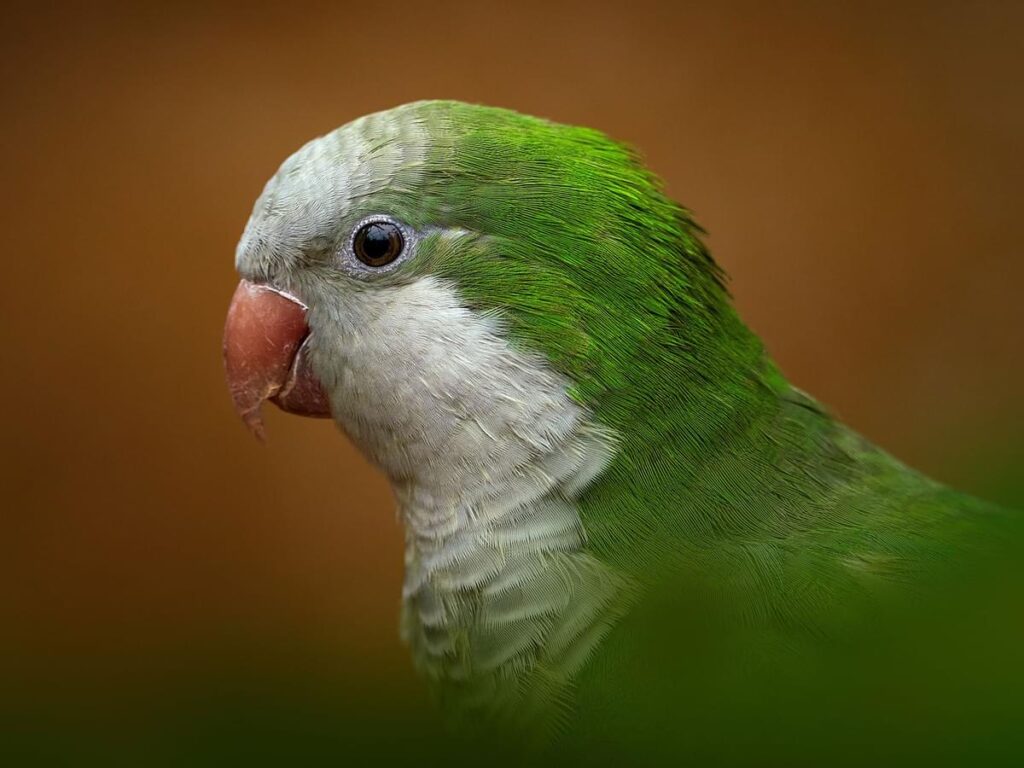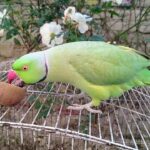Quaker parrots typically live between 20 to 30 years. Proper care and a healthy diet can extend their lifespan.
Quaker parrots, also known as Monk Parakeets, are popular pets due to their charming personalities and vibrant colors. These intelligent birds are native to South America and can mimic human speech, making them delightful companions. Their lifespan can reach up to three decades, reflecting their need for long-term commitment from owners.
Providing them with a balanced diet, regular veterinary care, and mental stimulation is essential. Quaker parrots thrive in environments where they receive ample attention and social interaction. Understanding their needs helps ensure they live a healthy, happy life.
:strip_icc()/facts-about-quaker-parrots-390854_final-resized-4ef3394617c848fdb8e27f7d8d12dda8.jpg)
Credit: www.thesprucepets.com
Introduction To Quaker Parrots
Quaker Parrots, also known as Monk Parakeets, are fascinating birds. They are small, social, and full of character. Originating from South America, they have vibrant green feathers and a unique charm.
What Makes Quaker Parrots Unique
Quaker Parrots have a distinct personality. They are known for their talking ability. These parrots mimic sounds and words with ease. They are also skilled at building nests. Unlike other parrots, Quakers create intricate nests using twigs and branches. They form strong bonds with their owners. Their social nature makes them affectionate pets.
Popular Pet Choice
Quaker Parrots are a popular pet choice for many reasons. They are small in size, making them easy to house. Their playful nature makes them entertaining companions. These birds have a lifespan of 20 to 30 years. With proper care, they can live long, healthy lives. Quaker Parrots are also known for their intelligence. They enjoy learning tricks and solving puzzles.
| Characteristic | Details |
|---|---|
| Size | Small |
| Origin | South America |
| Lifespan | 20 to 30 years |
| Abilities | Talking, Nest Building |
- Quaker Parrots are small, vibrant birds.
- They have a unique ability to mimic sounds.
- Quakers are skilled nest builders.
- They bond strongly with their owners.
- They are intelligent and love learning tricks.
Average Lifespan
The Quaker Parrot, also known as the Monk Parakeet, is a popular pet. Knowing its average lifespan can help you provide better care. This section will give you insights into how long a Quaker Parrot lives, focusing on typical age range and factors influencing lifespan.
Typical Age Range
A Quaker Parrot typically lives between 20 to 30 years. With good care, some may even reach the age of 35. These birds are known for their strong health and adaptability.
| Condition | Average Lifespan |
|---|---|
| Wild | 15-20 years |
| Pet | 20-30 years |
Factors Influencing Lifespan
Several factors affect a Quaker Parrot’s lifespan:
- Diet: A balanced diet is crucial. Include fruits, vegetables, and seeds.
- Environment: A clean, safe cage with toys keeps them happy.
- Exercise: Regular flying time and play prevent obesity.
- Healthcare: Regular vet check-ups are vital for early disease detection.
Ensuring these factors will help your Quaker Parrot live a long and healthy life.
Diet And Nutrition
A Quaker Parrot’s diet plays a crucial role in its lifespan. A balanced diet ensures they stay healthy and live longer. Let’s explore the essentials of a healthy diet and the foods to avoid.
Healthy Diet Essentials
Quaker Parrots need a variety of foods to stay healthy. Their diet should include:
- Pellets: These should make up about 60-70% of their diet. Choose high-quality pellets with no artificial colors.
- Fresh Vegetables: Offer a mix of leafy greens, carrots, and bell peppers. These provide essential vitamins and minerals.
- Fruits: Serve fruits like apples, berries, and melons in moderation. They are a good source of vitamins but contain sugar.
- Seeds and Nuts: These should be given sparingly as treats. They are high in fat.
- Grains: Include cooked grains like rice, quinoa, and oats for added fiber and nutrients.
Always provide fresh water daily. Clean the water dish to prevent bacteria growth.
Foods To Avoid
Some foods are harmful to Quaker Parrots and should be avoided. These include:
- Avocado: Contains persin, which is toxic to birds.
- Chocolate: Can cause serious health issues and even death.
- Caffeine: Affects the heart and nervous system of birds.
- Alcohol: Never give alcohol to birds; it is highly toxic.
- Onions and Garlic: Can cause digestive problems and anemia.
- Salty Foods: Excess salt can lead to kidney issues and dehydration.
- Processed Foods: Avoid giving them chips, cookies, and other junk food.
By sticking to a balanced diet and avoiding harmful foods, your Quaker Parrot can enjoy a healthier, longer life.
Habitat And Living Conditions
Quaker Parrots are delightful companions with a relatively long lifespan. Their habitat and living conditions play a crucial role in how long they live. Providing the right environment can significantly impact their health and happiness.
Ideal Cage Setup
Quaker Parrots need a spacious cage. The cage should be at least 18x18x18 inches. A larger cage is always better. Ensure the bars are horizontal for climbing. The bar spacing should be 1/2 inch or less to prevent escape.
- Multiple perches at different heights.
- Variety of toys for mental stimulation.
- Fresh water and food dishes.
- Cage cover to ensure a good night’s sleep.
Place the cage in a quiet but social area. Avoid placing it in the kitchen due to fumes. Ensure the area has natural light but avoid direct sunlight.
Importance Of Social Interaction
Quaker Parrots are social creatures. They thrive on interaction with their human companions. Daily interaction is essential for their mental health.
- Talk to your parrot regularly.
- Play games like fetch or hide and seek.
- Train them with simple commands.
- Provide out-of-cage time daily.
Lack of interaction can lead to behavioral issues. Ensure they feel like part of the family. This increases their lifespan and improves their well-being.
Health And Wellness
Ensuring the health and wellness of your Quaker parrot is crucial for its longevity. These vibrant birds thrive with proper care and attention. Understanding common health issues and preventive care can significantly extend their lifespan.
Common Health Issues
Quaker parrots are prone to several health problems. Being aware of these issues helps in early detection and treatment.
- Respiratory Infections: Symptoms include sneezing, nasal discharge, and labored breathing.
- Feather Plucking: Often caused by stress, boredom, or poor nutrition.
- Psittacosis: A bacterial infection that can spread to humans.
- Obesity: Results from a diet high in seeds and lack of exercise.
Preventive Care Tips
Preventive care is key to keeping your Quaker parrot healthy. Follow these tips to ensure your bird’s well-being:
- Balanced Diet: Include fruits, vegetables, and pellets in their diet.
- Regular Vet Check-ups: Schedule annual visits to a specialized avian vet.
- Clean Environment: Keep their cage and surroundings clean to prevent infections.
- Exercise and Mental Stimulation: Provide toys and opportunities for physical activity.
Maintaining a healthy lifestyle for your Quaker parrot ensures a long, happy life.

Credit: www.animalhumanesociety.org
Exercise And Mental Stimulation
Exercise and mental stimulation are vital for a Quaker parrot’s health. These activities help improve their physical and mental well-being. A well-exercised and mentally stimulated Quaker parrot can live a longer, happier life.
Importance Of Physical Activity
Physical activity helps keep your Quaker parrot fit and healthy. Regular exercise reduces the risk of obesity and related health issues. It also strengthens their muscles and improves their cardiovascular health.
Engage your Quaker parrot with daily flight time. Allow them to fly in a safe, supervised space. This helps improve their stamina and coordination. You can also encourage climbing activities. Use bird-safe ladders and perches to promote climbing.
Toys And Enrichment
Mental stimulation is essential for a Quaker parrot’s mental health. Provide a variety of toys and enrichment activities. This keeps their mind sharp and prevents boredom.
| Type of Toy | Benefits |
|---|---|
| Foraging Toys | Encourages natural foraging behavior |
| Chew Toys | Helps maintain beak health |
| Puzzle Toys | Stimulates problem-solving skills |
| Interactive Toys | Promotes social interaction |
Rotate toys regularly to keep them interesting. Introduce new toys gradually to avoid overwhelming your bird.
Interactive play with your Quaker parrot strengthens your bond. Use toys that encourage interaction. This includes bells, mirrors, and ropes. Spend quality time with your parrot daily to keep them happy and healthy.
Remember, a stimulated Quaker parrot is a happy Quaker parrot. Provide both physical and mental activities for their well-being.
Training And Behavior
Training and understanding your Quaker parrot’s behavior are essential. Proper training ensures your feathered friend stays happy and well-behaved. Quaker parrots are smart and social birds. They thrive on interaction and learning new skills. This guide will help you train and understand your Quaker parrot better.
Basic Training Tips
Training a Quaker parrot requires patience and consistency. Here are some basic tips to get you started:
- Start Early: Begin training when the bird is young.
- Short Sessions: Keep training sessions short, around 10-15 minutes.
- Positive Reinforcement: Use treats and praise to reward good behavior.
- Consistency: Train at the same time each day to create a routine.
- Basic Commands: Teach simple commands like “step up” and “come here”.
Understanding Behavior Patterns
Quaker parrots have unique behavior patterns. Recognizing these can help you train them effectively:
| Behavior | Meaning |
|---|---|
| Head Bobbing | The bird is excited or wants attention. |
| Feather Fluffing | Indicates relaxation or contentment. |
| Beak Grinding | The bird feels safe and comfortable. |
| Wing Flapping | Shows excitement or exercise. |
| Feather Plucking | Indicates stress or boredom. |
Understanding these behaviors helps in addressing their needs. It also aids in creating a strong bond with your Quaker parrot.
Signs Of Aging
Quaker parrots, also known as monk parakeets, are charming and social birds. Knowing the signs of aging can help you provide better care for your feathered friend. As Quaker parrots age, they exhibit various physical and behavioral changes.
Physical Changes
Older Quaker parrots show noticeable physical changes. Their feathers may become dull and less vibrant. You might see more grey or white feathers mixed with their usual green. They may also lose feathers more frequently.
Weight changes are common. Some Quaker parrots gain weight, while others lose it. Monitor their diet and weight closely. An aging Quaker parrot may also have more visible scales on their legs and feet.
Behavioral Changes
Aging Quaker parrots often display behavioral changes. They may become less active and prefer to rest more. Playtime might not be as exciting for them anymore. They could also become less vocal and chirp less frequently.
Older Quaker parrots may show signs of increased dependence on their owners. They might seek more cuddles and attention. Changes in sleep patterns are also common. They might sleep more or at different times.
:strip_icc()/monk-parakeet-in-barcelona-1283029076-245274da359546a6a9a726bdb23a2064.jpg)
Credit: www.thesprucepets.com
Conclusion
Understanding the lifespan of a Quaker parrot helps in providing proper care. These birds can live up to 30 years. Proper nutrition, mental stimulation, and regular vet visits are crucial. A well-cared-for Quaker parrot can be a long-term, delightful companion.
Invest in their health for a rewarding relationship.
Ryan Everhart is a passionate bird enthusiast and blogger, primarily writing on his website, Avian Whispers. His journey into the world of bird blogging began with a deep interest in parrots, a species that captivated his attention for their intelligence and social behavior. Over time, his content expanded to cover a broader range of bird species, offering insights into bird behavior, care, habitats, and conservation.
Ryan is dedicated to educating his audience, which includes both new bird owners and seasoned enthusiasts. His writing is filled with personal experiences, expert knowledge, and practical advice on bird care. Through Avian Whispers, he aims to foster a deeper appreciation for birds, emphasizing their role in nature and the joys of having them as pets.
Starting with articles focused on parrots, Ryan’s work now encompasses a diverse range of topics such as feeding, training, habitat enrichment, and bird health. His love for birds extends beyond parrots, diving into various avian species. His informative and heartfelt writing reflects his commitment to the well-being of birds and the desire to help others connect with these creatures.
As a growing voice in the bird blogging community, Ryan strives to provide a platform where bird lovers can learn, share experiences, and connect over a shared passion for avian life. His blogs are not only educational but also serve as a reminder of the importance of protecting and nurturing the bond between humans and birds.




